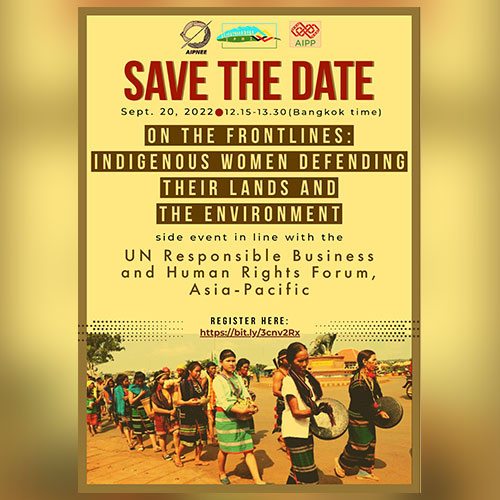
Background
It is estimated that 411 million of Indigenous Peoples live in Asia[1]. They represent 2,000 distinct civilizations and languages. Various terms have been used for Asia’s Indigenous Peoples, like “hill tribes” , “indigenous nationalities”, “tribal peoples”, “ethnic minorities”, “aboriginal people”, and “natives” and the corresponding names in local and national languages. In each country, their legal recognition vary which affects the exercise of their rights, particularly their collective rights to lands and self-determination.
Indigenous Peoples’ territories are part of the twenty percent of the global land area that is home to 80 percent of the world’s biodiversity. In Asia, around only 8.7 percent of territories held by Indigenous Peoples and other local communities are legally recognized.[2] The biodiversity and natural resources present in their lands and territories invite interest from business industries e.g., extractives, tourism, and agribusiness, among others. Often, the presence of these business actors in their territories equate to threats to their safety and security.
When their lands and territories are demarcated, often without proper free, prior and informed consent (FPIC), to development aggression projects, States and business actors collude to force indigenous communities out of, if not criminalized and/or killed when they claim ownership, occupy, or use their lands and territories.
In Indigenous Peoples Rights International’s 2022 annual report on Criminalization of, Human Rights Violations and Impunity against Indigenous Peoples, the 19 case stories from six countries, wherein 8 stories are from two countries in Asia, highlight the long-time struggles and strength of indigenous communities together with their Indigenous leaders and activists in defending their collective rights to lands and self-determination, as well as their individual rights. Furthermore, between the period of 2020 and 2022, Asia Indigenous Peoples Pact (AIPP’s) documented more than 300 cases of human rights violations against Indigenous Peoples in 9 countries in Asia.
In this side-event, we would like to present the stories of Indigenous leaders and representatives against large scale agribusiness in Cambodia, palm oil in Indonesia, energy and extractive industries in the Philippines, India, and illegal construction of Marriott resort in Bangladesh. Our side-event will highlight the perspectives and experiences of Indigenous women as land rights defenders and as crucial members of their communities engaged in food production, conservation and management of their lands and resources. We will also share the existing initiatives available for Indigenous Peoples that can support their planned or ongoing strategies in defending their rights and freedoms. We hope our side-event will also underline the connections between the local struggles of Indigenous women and their communities, and the global efforts to address climate change and biodiversity loss.
Program of event
Moderator: Robie Halip

